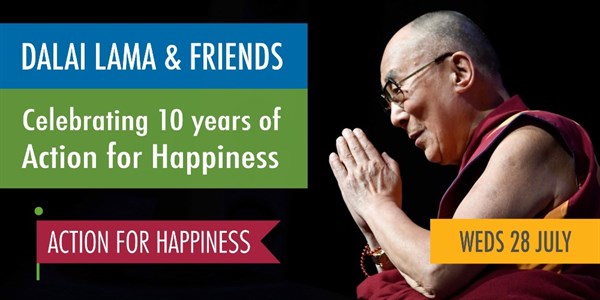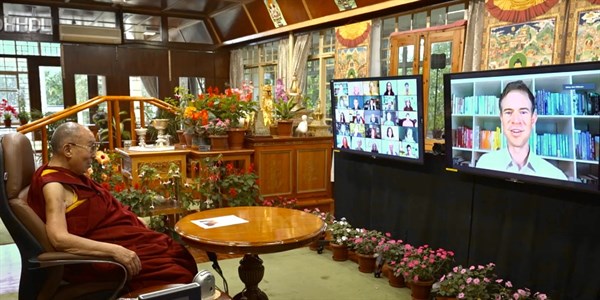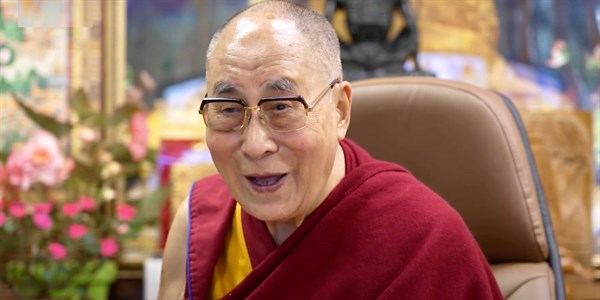Dalai Lama celebrates 10 years of Action for Happiness
28 Jul 2021 | Action for Happiness
His Holiness The Dalai Lama says community is
the answer to climate change, grief and the pandemic.
The Dalai Lama has emphasised the importance of community as a
way to tackle global problems. At a special audience held to mark the 10th anniversary
of Action for Happiness, the Tibetan spiritual leader answered
questions on happiness, compassion, grief, young people, climate
change, mental health and the pandemic. He told the virtual
gathering that "community is the basis of happiness and a
successful life".

> Watch the Dalai Lama event video here

"I appreciate the work by members of the Action
for Happiness community to create a happier and more compassionate
society. This is what our world needs" ~ Dalai Lama

The Dalai Lama is a global thought-leader on happiness and
compassion and is seen by many of his supporters as a living
embodiment of compassion, wisdom, and equanimity. He has made
several interventions during the pandemic, including urging
political leaders to take climate breakdown seriously and
encouraging people to get vaccinated.
The consistent message he gave to the special audience was that
separation by race, nationality and religion are outdated modes of
thinking. Such notions should be secondary to the oneness of all
human beings on earth. He said "we are social animals, one
individual's survival depends on the community… affection,
warm-heartedness and taking care of each other is the key factor"
and that "a sense of brotherhood and sisterhood will develop a
truly peaceful society… so we can build a concept of oneness of
seven billion human beings". He said that this transcends religion
and that he hoped we could learn to live together on the planet to
solve the most significant crises we are facing today.
When asked about climate change, the Dalai Lama noted it was
beyond our individual control but said that by uniting with a sense
of "sisterhood and brotherhood" for all humans, we could feel
supported to act in the world. He spoke of the recent floods in
Germany and said, "when things are difficult, people come out and
help each other, this is human nature, combining our intelligence
and warm-heartedness will create a much safer world and a much
happier world."

Dr Mark Williamson, Chief Executive of Action for Happiness,
said
"As His Holiness reminds us, we can't be happy or live a
fulfilling life if we try and do it alone. The pandemic has brought
some people together, but many others have been isolated, and we
have also seen increased division, particularly online. Today is an
important reminder that happiness comes from community, mutual
support, good relationships and being together. Our members are
taking action daily in their local communities to create more
happiness, and the pandemic has made this work more vital than
ever."
When asked about his relationship with Archbishop Desmond Tutu
and how to bridge racial and ethnic divides, the Dalai Lama again
spoke of the need to find common ground instead of division. He
said that "different religions, different circumstances are
secondary, basically we are human" and that despite having
different faiths, Tutu "is a brother and we can all develop
loving-kindness and respect to all humanity regardless of religion
or belief".

When asked about grief and loved ones lost during the pandemic,
The Dalai Lama was moved by people's loss and spoke of the
importance of community in recovering from grief. He said that "we
may lose one individual, but community carries the oneness.. all
your neighbours should give trusted friendship and community". He
expressed grief can be an opportunity to seek guidance and be
grateful for those still in our lives. For example, if we lose a
husband, we may still have a brother or sister. He also spoke of
the importance of legacy and honouring our relatives by carrying
them forward in how we live our lives.
When asked about the difficulties healthcare workers faced
during the pandemic, the Dalai Lama said no one should feel guilty
for needing rest or taking care of themselves. He said: "for people
who are really dedicated to serving other people, taking care of
themselves is also indirectly helping serving others" and to help
as many people as possible they should "keep a fresh mind and think
about your own rest and physical comfort" when needed.
When asked how we can support children's mental health in the
pandemic, he suggested that "education should teach inner peace..
and include warm-heartedness". He urged the younger generation to
retain a "hopeful optimism" despite the world's challenges and
think of themselves as the "same humanity, living together" and
working to solve the world's problems together.
The Dalai Lama said:
"Happiness comes from our actions and warm-heartedness.
I appreciate the work by members of the Action for Happiness
community to create a happier and more compassionate society. This
is what our world needs"
Notes to Editors
For interviews, further comment and information, please contact:
Sarah Vero Head of Communications Action for Happiness: 07414639227
[email protected]
-
A
recording of the live stream is available on
the Dalai Lama's Youtube channel.
-
The special event to celebrate 10 years of Action for
Happiness, including highlights of the Dalai Lama conversation
plus other special guests, is available on the AfH YouTube
channel.
-
Action for Happiness is a UK Charity with
over 270,000 members and over a million followers online. Its
patron is the Dalai Lama. It has no commercial, political or
religious affiliations. Anyone can join Action for Happiness
by pledging to create more happiness and less unhappiness in the
world.
-
AfH promotes the
Ten Keys to Happier Living underpinned by
the latest research in positive psychology. It also provides daily
actions people can take to be happier and kinder through its
app and
online calendar, which millions of people
use.
-
Throughout the pandemic, AfH has supported its
members to meet in
online groups to talk about happiness and
mental health. It's flagship 8-week
Exploring What Matters course has been run
in over 250 locations and attended by thousands of people. It also
hosts regular
online webinars with leading thinkers on
happiness, wellbeing and mental health, supports a network
of
Happy Cafes and provides resources
for
schools and
organisations.